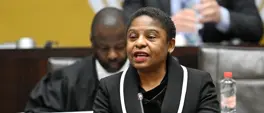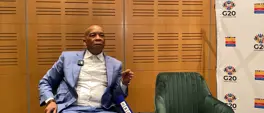JUDITH FEBRUARY: Democrats worldwide rightly troubled by Trump's return to power
Judith February
20 January 2025 | 10:48Despite the flaws of the Kamala Harris candidacy, it all seems rather incredulous that a convicted felon is now re-occupying the White House, writes Judith February.
This year is off to an angst-ridden start - wildfires, the reminder of the global climate crisis in LA and here at home, miners trapped inside old mines, a reminder of deep inequalities and poor governance.
Those who believe in democracy and the rule of law worldwide are rightly troubled by Donald Trump’s return as US President; the ultimate comeback.
Despite the flaws of the Harris candidacy, it all seems rather incredulous that a convicted felon is now re-occupying the White House. Trump’s re-election has sent more than a ripple across the world; it has the potential to blur the boundaries of the world order as we know it and provides licence to every leader with an authoritarian bent to push the boundaries and create further schisms between Europe, the US and the rest of the world.
South Africa, with its challenges and unique ability to stymie our progress, will not be immune to the threat of further democratic degradation in the US or that country’s increasing protectionist tendencies. South Africa’s presidency of the G20 is clearly being used by President Cyril Ramaphosa to prop up his own insipid Presidency. It is not necessary to repeat here the multiple ways in which Ramaphosa has displayed inaction in governing.
Late last year, his inability to fire the Justice and Constitutional Development Minister Thembi Simelane evoked outrage. Instead, Ramaphosa simply moved her sideways to the Human Settlements portfolio. Presumably the unhoused of our country deserve a minister operating with a cloud of corruption over her head.
The ongoing Stilfontein mining disaster has garnered headlines around the world. As illegal miners were trapped underground, Ramaphosa’s Minister in the Presidency Khumbudzo Ntshavheni felt most comfortable with random cruelty, saying, half-mockingly, “You want us to send help to criminals? You want us to send help to criminals, honestly?” Not content to stop there, she continued: “We are not sending help to criminals. We are going to smoke them out.
“They will come out. We are not sending help to criminals. Criminals are not to be helped, criminals are to be persecuted. We didn’t send them there, and they didn’t go down there with good intentions for the republic, so we can’t help them. Those who want to help them, they must go and take the food down there. They will come out, we’ll arrest them.”
What a disgrace. At the time of writing, fraud and corruption allegations have surfaced against Ntshavheni herself. It would be ironic were the cabinet not harbouring its fair share of misfits. All the while the President remains inert. Many are already calling Stilfontein another Marikana. This government therefore has much to answer for.
Politically this will be a year where Ramaphosa faces pressure from his party, the ANC, and from within and outside of the GNU. While many have been critical of the GNU and while South Africans are quick to move on and simply get on with the business of living (often hard in a country as unequal and violent as ours), there is a tendency to forget that we held another free and fair election last year and now have a GNU in place.
The election result was accepted by the ANC with no complaint or threat of violence or insurrection, rather more, resignation. The GNU is imperfect and has far too many interlocutors which undermines its stability. And we fool ourselves if we believe that things are settled, leaving aside the threat of the MK Party, its noise and dangerous rhetoric. That party has now taken over the mantle of the EFF as disruptors and anti-constitutionalists.
Julius Malema, now so beleaguered as his comrades jump ship, when delivering his latest political report to the EFF’s National People’s Assembly called for the safeguarding of constitutional supremacy, albeit followed by a contorted argument about the role of judges and judicial review. Given Malema’s past outbursts about the judiciary and the constitution, it is hard to take his sudden commitment to constitutionalism that seriously and some of it has a forked tongue about it.
Now is the time for real democrats to protect and defend the Constitution not those who do so out of political expediency.
The crown lies uneasily on Ramaphosa’s head as he seeks to balance the interests of his party with those of the country; often these are entirely incompatible. With shrill Helen Zille in the background being given far more media attention than should be the case, the road ahead for the GNU is anything but smooth. The recent controversy over the Bela Bill has shown this starkly, and there will be many other examples which will play out behind the scenes and in sensationalist media coverage.
Being discouraged has become the daily norm now. Recently the G20 sherpas met in Johannesburg even as that city has severe water and energy challenges, rubbish piling up on the streets and on-again, off-again mayoralty and a media-loving, bloviator as Premier, interested in anything other than governing in the best interests of all citizens. Johannesburg is but one part of the country where infrastructure is falling apart, unemployment has reached crisis levels and violent crime remains intolerably high.
It is therefore not hard to become despondent and to draw inevitable conclusions about the trajectory of South Africa. Similarly, as the world prepares for another Trump presidency, all manner of unexacting analysis has made headlines.
But, as Mark Mazower who teaches history at Columbia University wrote so eloquently in his recent Financial Times article entitled, ‘The exceptional nation’, even though democratic norms appear ‘unusually fragile’, Trump’s victory needs to be the harbinger of an ‘authoritarian future’ for Europe. (Here one may insert ‘the rest of the world’ too).
As Mazower says, the world needs to break the habit of seeing the US as ‘a kind of precursor’ while using fascism as the new threat to Europe, the US and the world. Mazower masterfully picks apart the theory that the US will automatically now slide into a kind of fascism and that Europe at least will follow suit.
He distinguishes the European experience from the US historical one; how fresh in the memory fascism, Nazism and the great wars are and how sui generis the US is in so many ways. He points to the divergent historical experiences of the US and Europe, together with Europe’s geographical vulnerability which has forced a greater commitment to institutionalism and cooperation (despite Brexit and the general anxiety within the EU). “Polarisation in the US for instance is unchecked and unbounded by ‘historical memories that serve to buttress democracy’, Mazower writes.
Mazower’s challenge is therefore for us to avoid the obvious and he asks another more interesting and pertinent question, which rises above the inevitable navel-gazing the Democrats are doing in the wake of the November result. The ANC has not been given to such introspection and continues apace as if it had now been cut down to size by the electorate, of course.
Mazower’s challenge is to ask, "Why democracy was in crisis?" and then says pointedly, "Fascism may not be what awaits it… but fascism is not the only test and the sooner this is understood, the better we will be able to orient ourselves in the uncharted territory that lies ahead."
As the world continues to face polycrises, we do so in a more unknown setting than ever before, no matter where in the world we find ourselves. We do ourselves a disservice when we make glib assumptions that fascism is the only option for what lies ahead. Might for instance democratic drift be more dangerous, a sort of paralysis where nothing can, in fact, be solved, whether climate change or inequality? Despite the glut of social media and the noise of the moment, there are no clear answers to the next political and global moment.
Rebecca Solnit in her seminal work, Hope in The Dark, written in 2003 after the start of the Iraq War, is instructive even now and worth reading in its entirety.
While the territory is uncharted it is not hopeless. Solnit writes with more than a hint of pragmatism when she says: “It’s important to say what hope is not: it is not the belief that everything was, is, or will be fine. The evidence is all around us of tremendous suffering and tremendous destruction. The hope I’m interested in is about broad perspectives with specific possibilities, ones that invite or demand that we act. It’s also not a sunny everything-is-getting-better narrative, though it may be a counter to the everything-is-getting-worse narrative. You could call it an account of complexities and uncertainties, with openings. Change is rarely straightforward.
Sometimes it’s as complex as chaos theory and as slow as evolution. Even things that seem to happen suddenly arise from deep roots in the past or from long-dormant seeds. It’s important to emphasise that hope is only a beginning; it’s not a substitute for action, only a basis for it. The status quo would like you to believe it is immutable, inevitable, and invulnerable, and lack of memory of a dynamically changing world reinforces this view.”
Her words echo Mazower’s whose theory simplified, really, is that we need to understand history before drawing undemanding conclusions about the world’s trajectory and therefore offering ‘quick fix’ solutions. For there are none. Hard as the next years will be, Solnit’s words are calling us to remake society in ways which are neither cynical nor naive and where hope is an act of defiance.
But we need to be asking the hard questions first, rooted in deep knowledge thoughtfully applied and not born merely out of the fear, loathing and panic of the moment.
Judith February is Freedom Under Law's executive officer.
Get the whole picture 💡
Take a look at the topic timeline for all related articles.
Trending News
More in Opinion

17 October 2025 12:54
MALAIKA MAHLATSI | Ntshavheni’s alarming constitutional delinquency, inhumanity and impunity

17 October 2025 12:42
CHRIS OXTOBY & JUDITH FEBRUARY | JSC interviews – Showing a challenging road ahead?

15 October 2025 14:59
CHARLES MATSEKE | South Africa’s quiet privatisation and the birth of an Oligopoly













